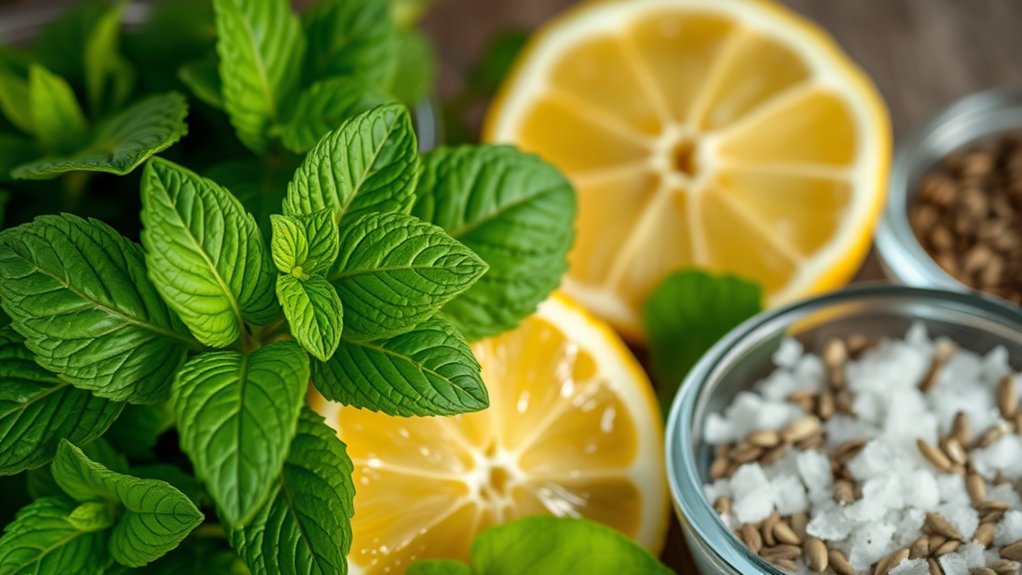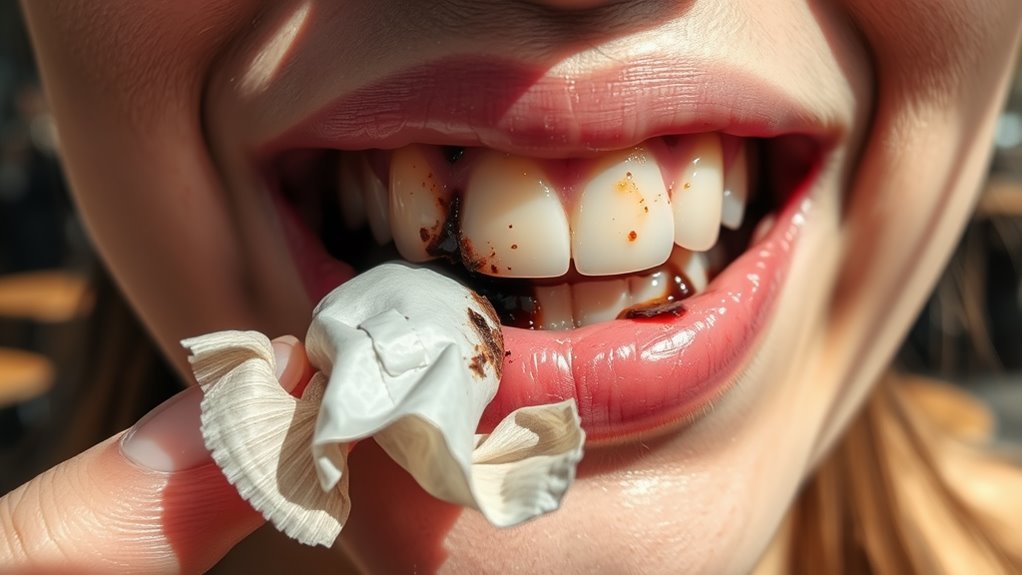How to Naturally Deodorize Your Mouth Daily
Maintaining fresh breath is essential for confidence and social interactions. You can naturally deodorize your mouth daily with a few simple strategies that focus on hydration, natural ingredients, and oral hygiene. By integrating specific foods and DIY solutions into your routine, you’ll be equipped to combat mouth odors effectively. Let’s explore these methods to discover how you can keep your breath fresh throughout the day.
Key Takeaways
- Regularly brush and floss to remove plaque and food particles, preventing bad breath.
- Rinse with natural mouthwash options like saltwater or peppermint oil to refresh your mouth.
- Stay hydrated by drinking water and consuming hydrating foods to manage oral moisture.
- Incorporate fresh herbs like mint, parsley, and sage into your diet for natural deodorizing effects.
- Avoid strong-smelling foods and limit sugar intake to reduce bacteria growth and mouth odor.
The Importance of Oral Hygiene
While you may think brushing your teeth is enough, maintaining good oral hygiene is crucial for overall health. Regular brushing, alongside flossing and rinsing, removes plaque and food particles that can cause bad breath. This ensures your mouth stays fresh and minimizes the risk of cavities and gum disease. Incorporating a natural breath fix, like herbal mouth rinses or coconut oil pulling, can further enhance your oral care routine. Additionally, choosing alcohol-free alternatives for mouthwash can help prevent dryness and maintain the balance of beneficial bacteria in your mouth.
Natural Ingredients for Fresh Breath
To achieve fresh breath naturally, you can rely on a variety of effective ingredients. Essential herbs like mint and basil, along with certain fruits and spices, can significantly improve your oral freshness. Incorporating regular dental visits can also address any underlying issues contributing to bad breath.
Essential Herbs for Freshness
Herbs play a crucial role in naturally deodorizing your mouth and promoting fresh breath. Incorporating herbs like mint, parsley, and sage into your daily routine can be particularly effective.
Mint not only masks odors but also possesses antibacterial properties that fight bad breath. Parsley, rich in chlorophyll, helps neutralize foul smells, while sage is known for its antimicrobial effects.
Try chewing fresh mint leaves or sipping herbal teas infused with these herbs. You can also create mouth rinses by steeping sage in hot water. These simple additions to your daily hygiene regimen can significantly improve your oral freshness.
Fruits That Fight Odor
Incorporating fruits into your diet can significantly aid in combating bad breath, as many naturally possess odor-fighting properties.
For instance, apples are high in fiber and stimulate saliva production, which helps wash away odor-causing bacteria.
Pineapples contain bromelain, an enzyme that effectively breaks down proteins and reduces foul smells.
Oranges and other citrus fruits boast vitamin C, which can inhibit bacterial growth in your mouth.
Strawberries also work wonders, as their acidity helps dissolve plaque that can harbor odor.
Spice Solutions for Breath
While you may not think of spices as traditional breath fresheners, many possess powerful properties that can combat bad odor and promote oral health.
Here are four spices to consider incorporating into your routine:
-
Cinnamon: Contains antimicrobial properties that help reduce bacteria in your mouth.
-
Cloves: Rich in eugenol, cloves can numb pain and kill bacteria, freshening breath.
-
Fennel Seeds: Their natural oils help neutralize odor and stimulate saliva production.
-
Mint: Not just refreshing, mint has antibacterial qualities that keep breath fresh.
Try these spices in teas or as chewing aids for a naturally fresher mouth.
Hydration: The Key to a Fresh Mouth
Hydration plays a crucial role in maintaining a fresh mouth, and it’s often overlooked. When you’re properly hydrated, saliva production increases, which helps wash away food particles and bacteria responsible for bad breath.
Inadequate hydration can lead to dry mouth, offering a prime environment for odor-causing bacteria to thrive. To keep your mouth fresh, drink plenty of water throughout the day.
Carry a water bottle to ensure you stay hydrated, especially in dry or air-conditioned environments. Additionally, consider hydrating foods such as fruits and vegetables to supplement your daily intake and promote optimal oral health.
Stay refreshed for a healthy smile!
DIY Mouthwash Recipes
Here are four simple recipes to try:
-
Saltwater Rinse: Mix 1 teaspoon of salt in a glass of warm water; swish for 30 seconds.
-
Peppermint Oil Mix: Combine 1 cup of water with 5 drops of peppermint oil; shake well before use.
-
Green Tea Infusion: Brew green tea, let it cool, and use it as a mouthwash for its antibacterial properties.
-
Baking Soda Solution: Mix 1 teaspoon of baking soda in a cup of water; rinse to neutralize odors. Staying hydrated helps to wash away food particles and maintain mouth moisture.
The Role of Diet in Mouth Odor
Your diet plays a significant role in mouth odor, influencing both the freshness of your breath and the overall health of your oral environment.
Foods rich in sugar and carbohydrates can promote bacterial growth in your mouth, leading to unpleasant odors. Additionally, strong-smelling items like garlic and onions can linger on your breath long after consumption. Consuming foods high in sulfur compounds can also significantly contribute to bad breath.
On the other hand, crunchy fruits and vegetables, such as apples and carrots, help clean your teeth and stimulate saliva production, which naturally deodorizes your mouth.
Staying hydrated with water also aids in flushing away food particles and bacteria, contributing to fresher breath.
Additional Tips for Maintaining Fresh Breath
To maintain fresh breath throughout the day, staying hydrated is essential. Drinking plenty of water helps wash away food particles and bacteria that cause bad odors. Additionally, choosing breath-friendly foods can make a significant difference in how your mouth smells. Consider incorporating fresh mint leaves, which contain antibacterial properties against odor-causing bacteria, into your diet for an extra boost in freshness.
Stay Hydrated Regularly
Hydration plays a crucial role in maintaining fresh breath and overall oral health.
When you’re well-hydrated, your body produces saliva more effectively, which naturally cleanses your mouth.
To stay hydrated, consider these tips:
-
Drink plenty of water throughout the day.
-
Carry a reusable water bottle to help track your intake.
-
Limit caffeine and alcohol, as they can lead to dehydration.
-
Add fruits or herbs like lemon or mint to your water for a refreshing twist.
Choose Breath-Friendly Foods
While staying hydrated is important for fresh breath, the foods you eat also play a significant role in maintaining oral freshness. Incorporate crunchy fruits and vegetables, like apples and celery, as they help scrub away plaque and stimulate saliva production.
Parsley and mint can naturally mask odors, so consider adding them to your meals. Avoid sugar-laden snacks and processed foods, which can promote bad breath.
Additionally, probiotic-rich foods like yogurt can support oral health by balancing bacteria. By choosing breath-friendly foods, you’ll enhance your overall oral hygiene and enjoy fresher breath throughout the day.




